This article originally appeared in the June 1985 issue of SPIN.
The Talking Heads invented the modern rock band. They found that if you're honest and sincere, it's possible people with similar feelings will discover you. They were the first band to have a girl play in the band without being the centerpiece or an Ikette. The Talking Heads discovered that a good, plain look can be the best look of all.
The Talking Heads image was no image. They looked suspiciously regular. They dressed like students. They dressed like housewives. The Talking Heads sang songs you could dance to that had nothing to do with love or sex.
Instead, the songs were about buildings, government, and people with mental problems. When they did a song about something conventional, like "Drugs," it was not so much a song about drugs as a stand-in for drugs.
The Talking Heads were the first American band to go to art school. Britain had art-school bands, like Roxy Music, but in Britain, one out of three people goes to art school to learn things like roof thatching. The Talking Heads combined a total modern-art sensibility with a total "wha' sup" awareness of the state of hip dance music. It was as if Andy Warhol were in Kool and the Gang.
Words for songs appear in a bubble above lead singer David Byrne's head. David Byrne has a big head, which is why he wears the big suit. He looks like a normal person, but slightly "off."
Any more off and he would be one of those people you can't stop staring at. He was into a Silicon Valley Boy style years before the movie Revenge of the Nerds was a hit. He looks like he ate a lot of beef jerky for breakfast. If David Byrne's bags were searched at customs, it would probably be for military secrets, not drugs. He was the first modern rock start to sound white and not English. Almost every rock singer before him sounded like a black cockney with an erection from the Merseysippi Delta.
[caption id="attachment_id_334413"] 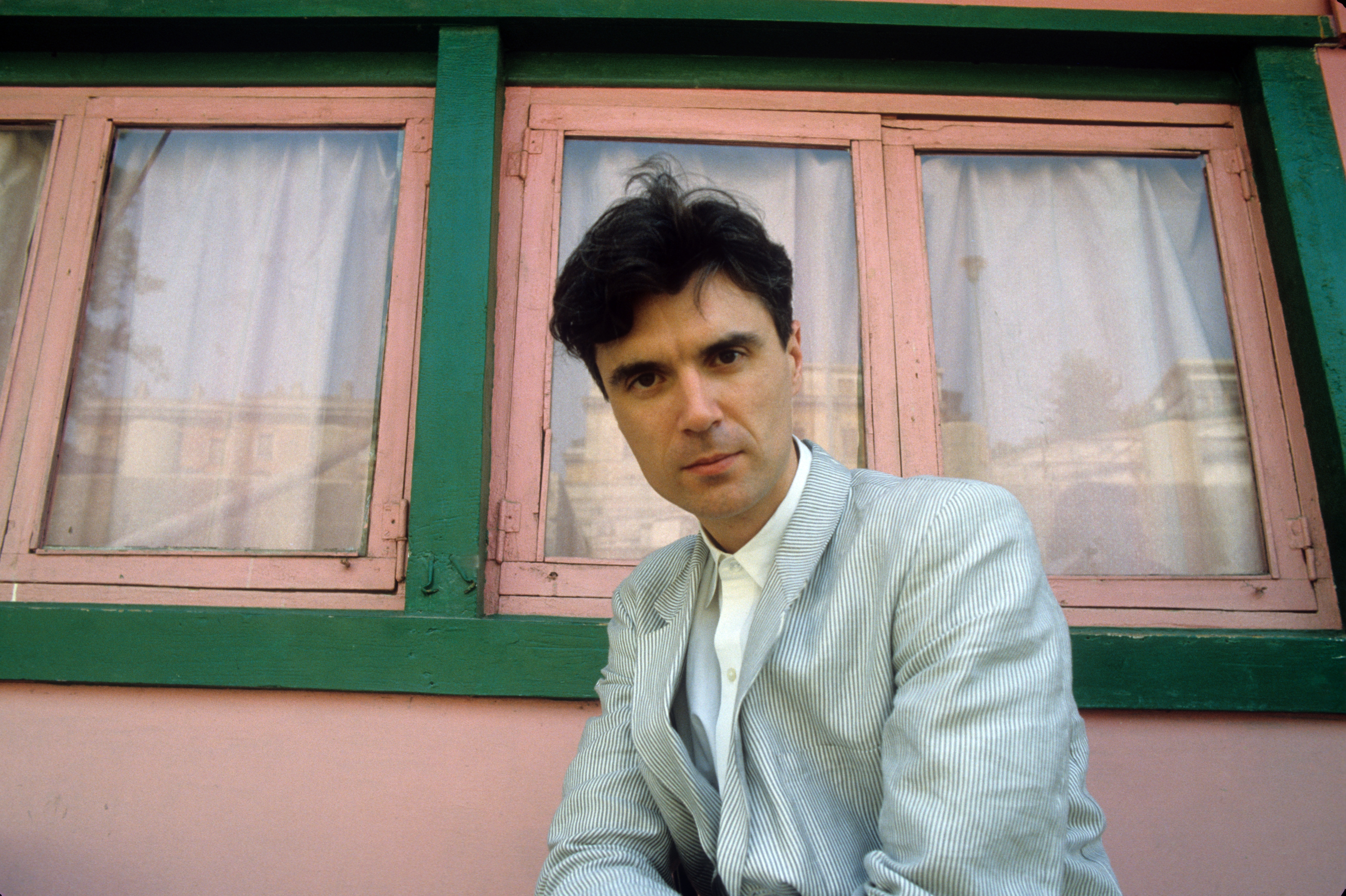 Luciano Viti/Getty Images[/caption]
Luciano Viti/Getty Images[/caption]
When he opened his mouth, he created a thousand singers. More, actually. David Byrne revolutionized singing. He sings like a man whose hair is on fire. It's his natural voice, but it jumps when he gets excited. He can sing words that are very heartfelt, but come out sounding like he's being strangled.
David Byrne is the heebee-geebee man. Nobody sang like that before. Nobody danced like that. He's always moving, like a house in motion. His moves are based on agility by implication—how far can he stumble without falling, how much balance can he lose without losing his balance?
Remember the song "Nobody can do the shing-a-ling like I do…Nobody can do the boogaloo like I do…"? Well, nobody can do hip spasms…nobody can do the surfin' gooseneck or the dipperty-doo or the hepileptic hop like David do.
Originally, Davie Byrne is from Baltimore, the same hometown as John Waters, Divine, Frank Zappa, H.L. Mencken, and F. Scott Key. He grew up in a neighborhood that's a cross between lower-class suburban and run-down rural. David's father worked for Westinghouse as an electronics engineer. David could have, too, but art seemed like more fun.
The kind of art that influenced his songs are paintings done by what's described as "outsiders," primitive people who might be schizophrenic and have no contact with the art world. "Outsiders" don't try to make something pretty. They got their own style that has nothing to do with the real world and is definitely not for public consumption.
https://www.youtube.com/watch?v=LQiOA7euaYA
The idea for the Talking Heads started with Chris Frantz. David had written some songs and didn't know what to do with them. Chris kept saying, "Let's start a band." Chris Frantz is a powerhouse drummer, but back then he looked like he was in nursing school. Today, even in black leather pants, he looks like a professor.
He's the kind of guy you want to sit next to you on an airplane. He has a way of putting you at ease. It must be his southern upbringing. Paging through the first issue of SPIN, Chris Frantz came across the album cover of the Butthole Surfers and laughed: "Can you imagine being in a band that you can't tell your mother the name of?"
Chris is trustworthy, loyal and kind; someone you'd buy a used car from. He's married to Tina Weymouth, his college flame. She offered to play bass and David taught her.
Tina is cool. She always looked very attractive, but she also looks like she can take a lawn mower apart and put it back together again in a half-hour. On stage she had the most perfect blank expression. Now when she performs, she smiles and looks radiant. Maybe it has something to do with her and Chris having a baby, or her having a chance to sing in her and Chris's band, the Tom Tom Club.
Keyboard player and guitarist Jerry Harrison looks like he keeps his little black book on floppy disk. Before he was a Talking Head, he was a Modern Lover. The Modern Lovers, like the Talking Heads, was a thinking-man's band. Jerry Harrison thinks about what he does. He's not the type to just jump into something.
At first, David wrote songs at his house in the Lower East Side and brought them, in a semi-finished state, to Long Island City, where the rest of the band lived. Then they'd work on a song until it was right.
The songs on Fear of Music were taped at Long Island City first and then brought back to the Lower East Side, where David worked on them. The words to the songs came by way of instructions to himself for what a song should be about. The instructions for "Animals" were: Write a song where animals set bad examples. Originally, the song was mixed with another song about Jesus being a hairy animal, but he cut that part.
[caption id="attachment_id_334422"] 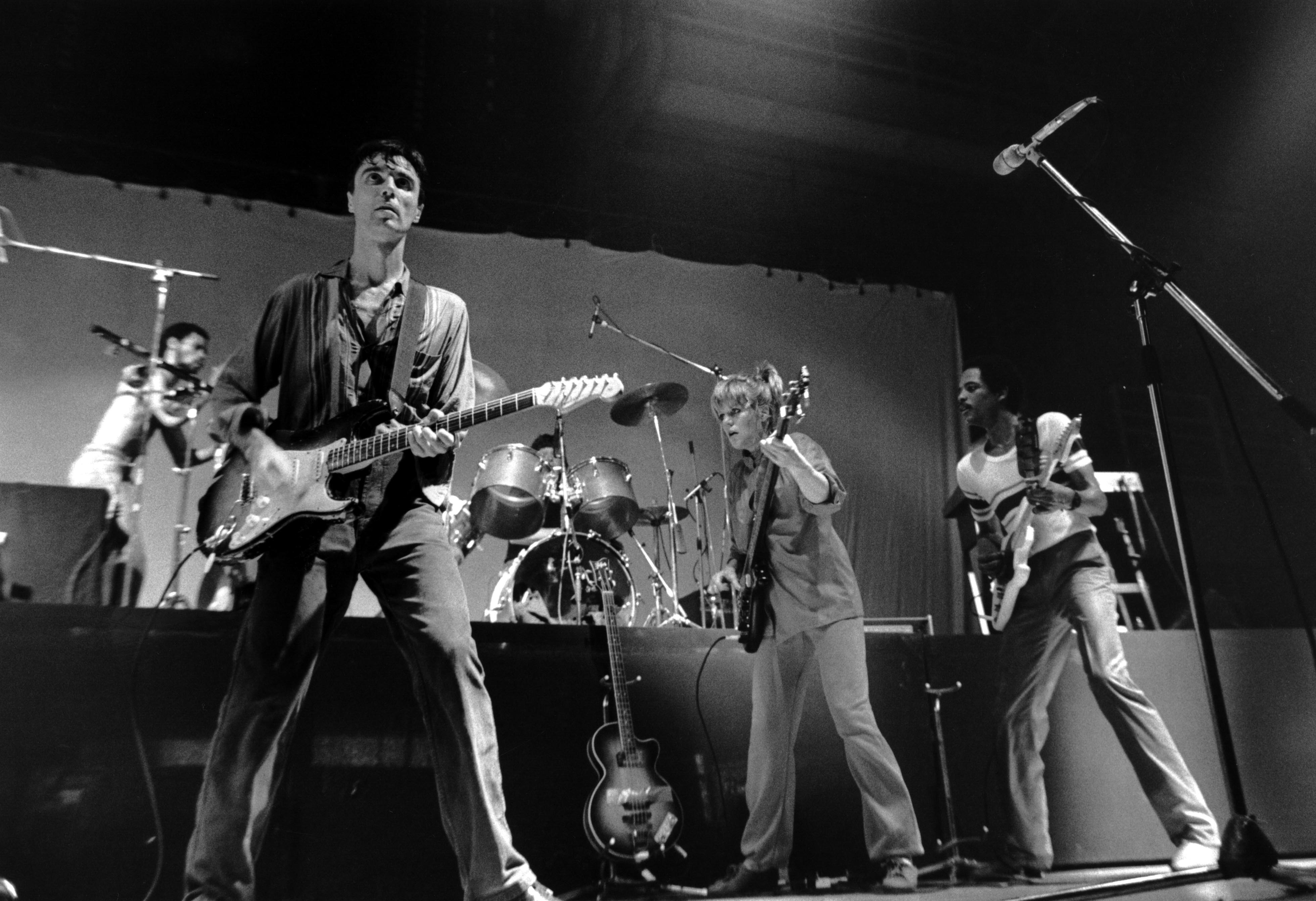 Brian Rasic/Getty Images[/caption]
Brian Rasic/Getty Images[/caption]
The instructions for "Cities" were to make a more accurate picture of real cities, with the names and landmarks and places where kids hang out. "Cities" was to be a guide. These instructions had been building inside him for a long time.
The instructions for Remain in Light came from the music. He'd listen to the track and ask himself, "What does this sound like? Does this sound like ecstasy, or does it sound ominous but with a hint of ecstasy in it?"
Some of the songs sounded kind of sad, but danceable at the same time. "The Listening Wind" had a melancholy feel, so he wrote a lyric that both told a story and had a melancholic edge. In "The Great Curve," the music was heavily rhythmic; so was "Born Under Punches." "Born Under Punches," has crazy rhythms that you ride like a mechanical bronco. That dictated this wacky vocal that was contrasted by smooth choruses.
Once he got into a frame of mind that was generated by the music, he could sit down for an hour or so and produce lots of disconnected words and phrases that seemed to fit that state of mind. Then he'd get very rational about it and edit the whole thing into a song.
Speaking in Tongues took the process a step further. Even more songs were completely irrational. They had absolutely no narrative content. The lyrics were almost a series of non sequiturs. After the band jammed a little in Long Island City, David took a cassette-player with him to Manhattan and selected the interesting fragments. The band learned those bits and played them back-to-back. When they had a few in succession, they had a song.
https://youtu.be/79kSk5ZDSCI
Meanwhile, David collected lots of phrases; any one of them could trip a whole host of associations that were funny. It could be a colloquial expression that, on its own, didn't mean much, but in the context in which it was said, sounded funny. It was pretty difficult working this way, because that phrase had to stand on its own merits. It couldn't be supported by anything around it. Each line had to have some kind of emotional impact.
The new Talking Heads album doesn't have a title yet, but it sounds like the Talking Heads. That's the album title Chris suggested: "Sounds like the Talking Heads." The band made a list of possible titles.
A man from the record company said he liked "Popular Mechanics," but thought they might have legal problems. He said when the sales force sees "Folk Songs," they're going to keel over. They're gong to think the Talking Heads are making a folk album and buyers will stay away in droves. It never occurred to the Talking Heads that people would think the Talking Heads made an album of folk songs.
The new album sounds the way the Talking Heads used to sound when it was just David, Tina, Chris, and Jerry; no "Afro-influ," no mumbo jumbo. They went back to the basic band because of the songs, which aren't groove-oriented, but do groove. The songs are traditional. "Perfect World," "Give me Back My Name," and "Road to Nowhere," are normal song titles.
One is a country song, with pedal steel guitar. The songs are typically Talking Heads songs, about liking someone for their peculiarities, or watching a neighbor through her window, or watching lots of television and being proud of it.
The new album is great because, unlike their last couple of albums, you can hum along to it while in the shower.
[caption id="attachment_id_334420"] 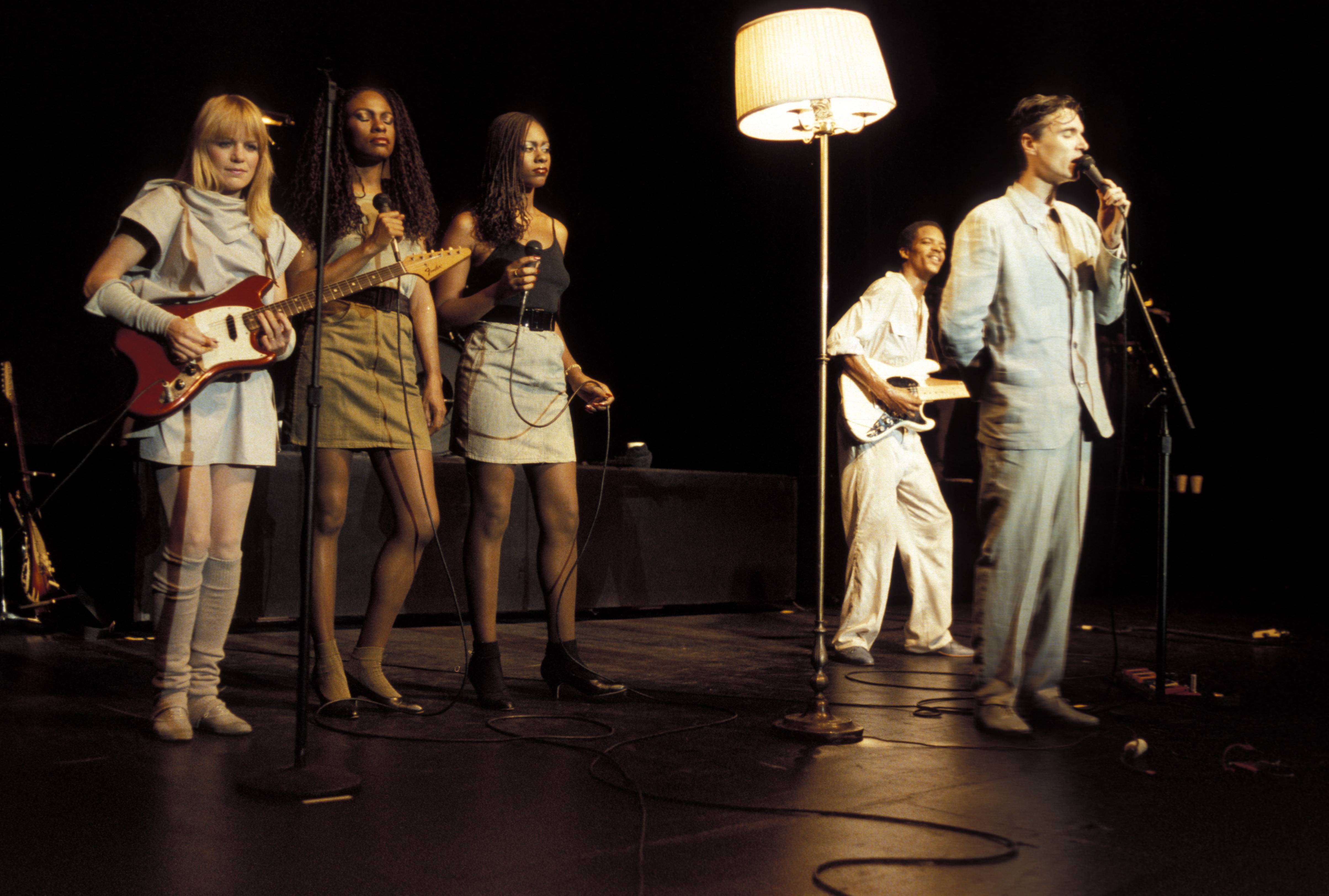 Richard E. Aaron/Redferns[/caption]
Richard E. Aaron/Redferns[/caption]
Tina: I've moved practically every year of my life, and for me, geographic distance and time don't make a difference, really. For some people who don't know who or where they are, that could be a problem. If you have a loose ego and are not sure who you are, you pick your identities wherever you are. If you move around a lot you might pick up accents. You may have been an American born in Texas, but then you go to England and you're talking like a cockney.
For me, that's not the case. I'm comfortable seeing somebody after a year or 10 years. Until we started making this album, we hadn't played together as a band in a year. As usual, the band's coming back together came when we decided we didn't need each other anymore.
For one thing, David got really interested in becoming a movie star. And a director, scriptwriter, and everything to do with movies. Jerry's been working on his second album and I've been a mother and a housewife.
We wanted to get Stop Making Sense made because it was a real fun tour. We were feeling very good and very positive about it, and we wanted to get that show documented in some form, because we didn't think it would ever happen again. After that film was made, we didn't know where to go.
And then when we got together in January, there was that feeling again, having come full circle. We were just four people singing some easy, simple songs with no pretensions to being avant garde, African or any of that…
https://youtu.be/cl3B_FTDKD0
Chris: In the past, we did these long jamming grooves and then arranged them into songs. This time, we went back to the way we did our first few albums—to have a song written, rehearsed, and then go in and record it. We've gone back to the basic band.
This record doesn't have drum machines. It doesn't have a lot of black backup vocals. The songs have a beginning, middle and end built into them, instead of having to create it by editing. It has a nice sound to it. A lot of people are going to be surprised. It has nice, pretty melodies and harmonies. The songs are kind of disarming in their approach.
As usual, it doesn't sound like what's currently fashionable. We've been on the dance bandwagon long enough. Maybe we were one of the first on that bandwagon, but now everybody's on it. There's just too much competition [Laughs].
[caption id="attachment_id_334425"] 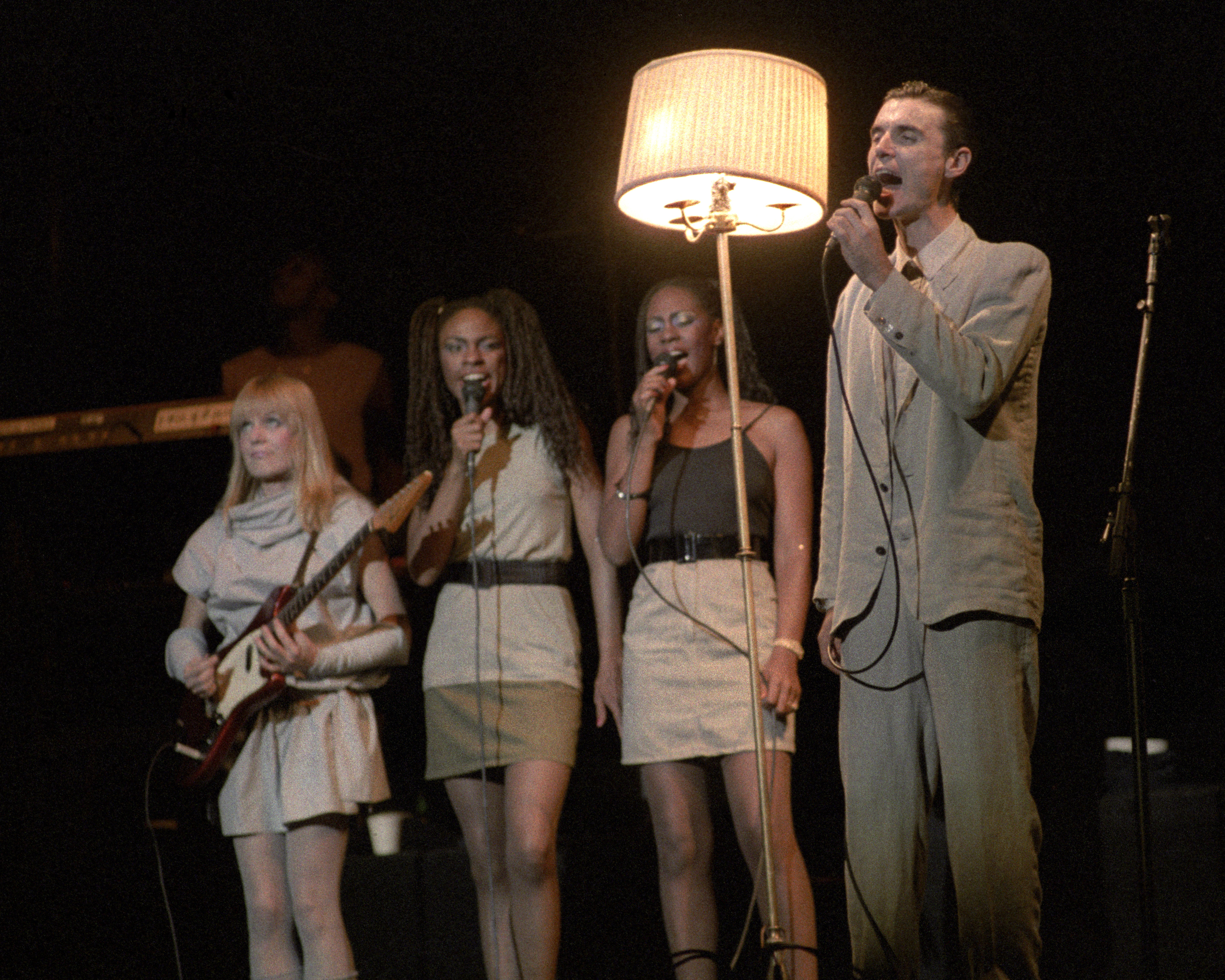 Clayton Call/Redferns[/caption]
Clayton Call/Redferns[/caption]
Jerry: I stared my second album over a year ago; it got interrupted so many times. Sometimes it's good for things to be interrupted. You might not make the same mistakes you would make if you just went straight ahead. Most of it was made in Milwaukee. I like the idea of sort-of indigenous recording. I used people who either lived in Milwaukee or were passing through. I got David Van Tieghem and Dickie Landry when they passed through, playing with Laurie Anderson. And Robby MacIntyre passed through with the Pretenders.
Bootsy was supposed to come through Milwaukee to play on this record I was making, "Five Minutes," which was inspired by President Reagan's joke about Russia, "The bombing begins in five minutes." He was in D.C. Bootsy's manager had arranged for him to speak to the U.S. House of Representatives, something I would have loved to have seen.
Booty's afraid to fly, so he drove all the way from D.C. I kept getting calls from this guy who'd say, "Bootsy's left Maryland now," "Boosty's halfway through Pennsylvania," "I just want you to know that Bootsy just crossed into Indiana and he has to take a nap now."
https://youtu.be/5IsSpAOD6K8
I never heard from Bootsy, just from this guy. I wondered if it was true. But he showed up. He did the recording, and the next day he got up and drove to Cincinnati.
There's something spiritual about Wisconsin. It's a little staid. It gets boring, but I think I enjoyed being there this time more than any other time I've been there. And I grew up there. I had a purpose for being there, but I also didn't feel trapped. I didn't feel worried like you do when you're growing up in a place like that, where you might get stuck.
I like living out of a suitcase. I like the feeling of only living for the day that you're in. On tour you sometimes have a sense of truly living in the present, as if there is no past. When I go to Europe, when I go to Holland, I find that I'll remember all the days that I was in Holland and I won'd remember where I was the day before. It's like the locality takes over and time stops. You feel like you've broken the treadmill of life.
As much as I love playing with the big band and having a big entourage with us, I get kind of sick of playing large places. When we first went on tour, our audience was small and it was special. It was allays the people that you'd want to meet in the town. There was never any fear of meeting them.
[caption id="attachment_id_334428"] 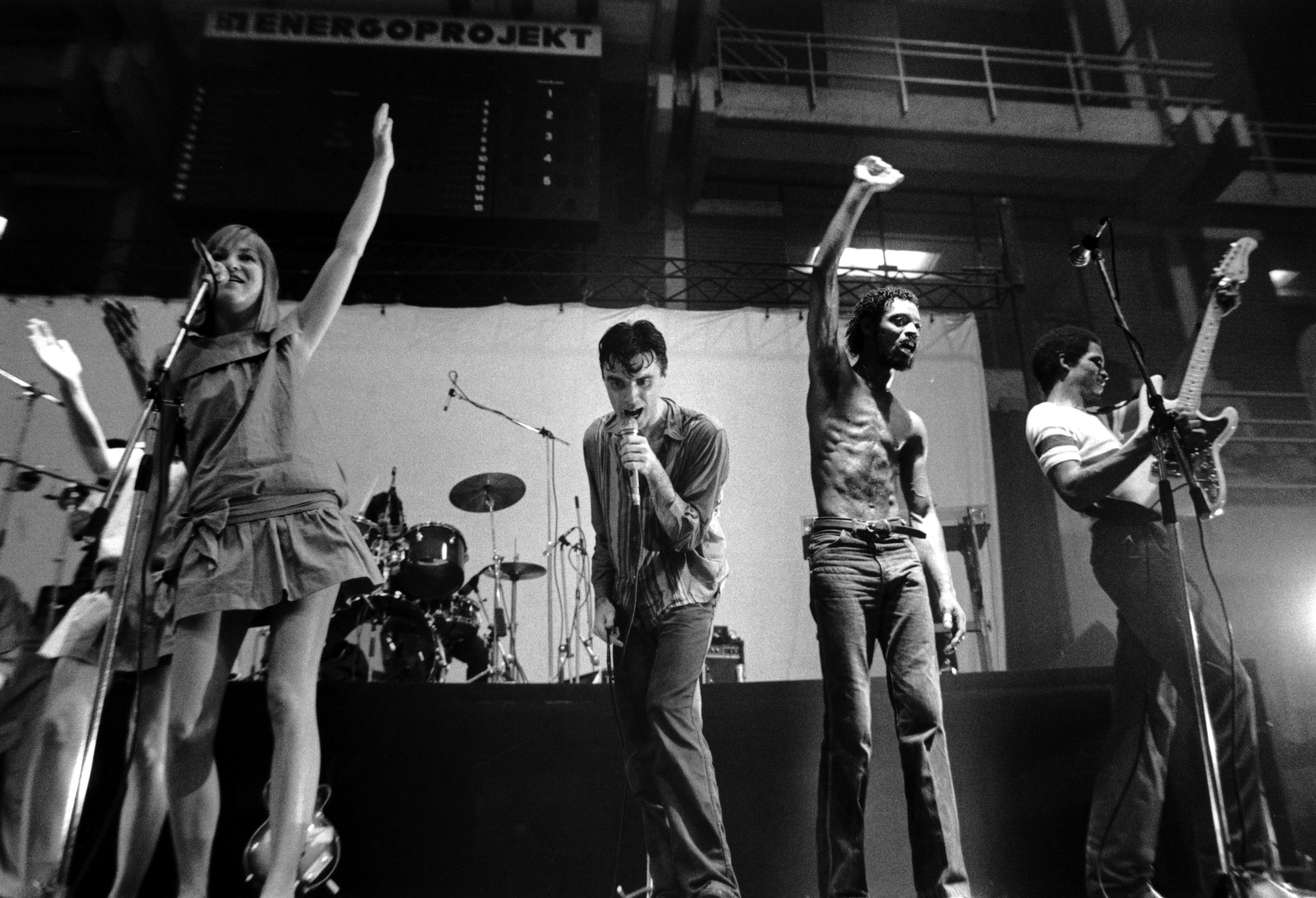 Brian Rasic/Getty Images[/caption]
Brian Rasic/Getty Images[/caption]
Now it's gotten to the point where we really have security between us and the audience. Now you only meet people if you go out after the show, or if they have some way to get back stage. So now you meet the professionals. A professional groupie or a professional person from a radio station or a record company. Although those people can be interesting, I like the freshness of going around meeting all kinds of people.
I remember especially the first tour we did with the Ramones; we were their opening act going all over Europe. We met the most wonderful people. We went over to their houses. We got an instant feeling for every city. We were invited to all the places that might take you weeks to find.
I can get nostalgic about touring. But I like performing. I love the excitement. I love the feeling that the performers have of having to perform no matter what. No matter what you did the night before or how sick you are or whatever. It's something a lot of people don't understand. It's a cliché, I suppose, but it's true. People think nothing of calling in sick to the office.
https://youtu.be/fsccjsW8bSY
David: I wanted to write a song about a girl who can float. That song is called "And She Was." The words were written in bits and pieces over the last year and a half. Two months ago, I tried putting the words to different kinds of music. I'd put words to music in one style, listen to it and rewrite it; put it in another style, listen to it and rewrite it.
Eventually I got one that clicked. I didn't know I wrote it. I had written a bunch of verses and the band learned them real quick, quicker than I thought, so I had to come up with the rest real quick. I was writing that song before and after rehearsal.
Then I was looking through some lyrics and I found two couplets that Chris had written years ago: "This is a perfect world" or "You're a perfect girl," or something like that, and "I'm riding on an incline / I'm staring at your face," and something else. I changed a few of the words. It had a bit of a bizarre quality that I really liked, so I paired them with some words I had written and that became "Perfect World."
A couple of songs were written in Los Angeles. One, "Road to Nowhere," is a kind of gospel Cajun march. It's a happy, upbeat song; all these people singing about being on the road to oblivion.
[caption id="attachment_id_334431"] 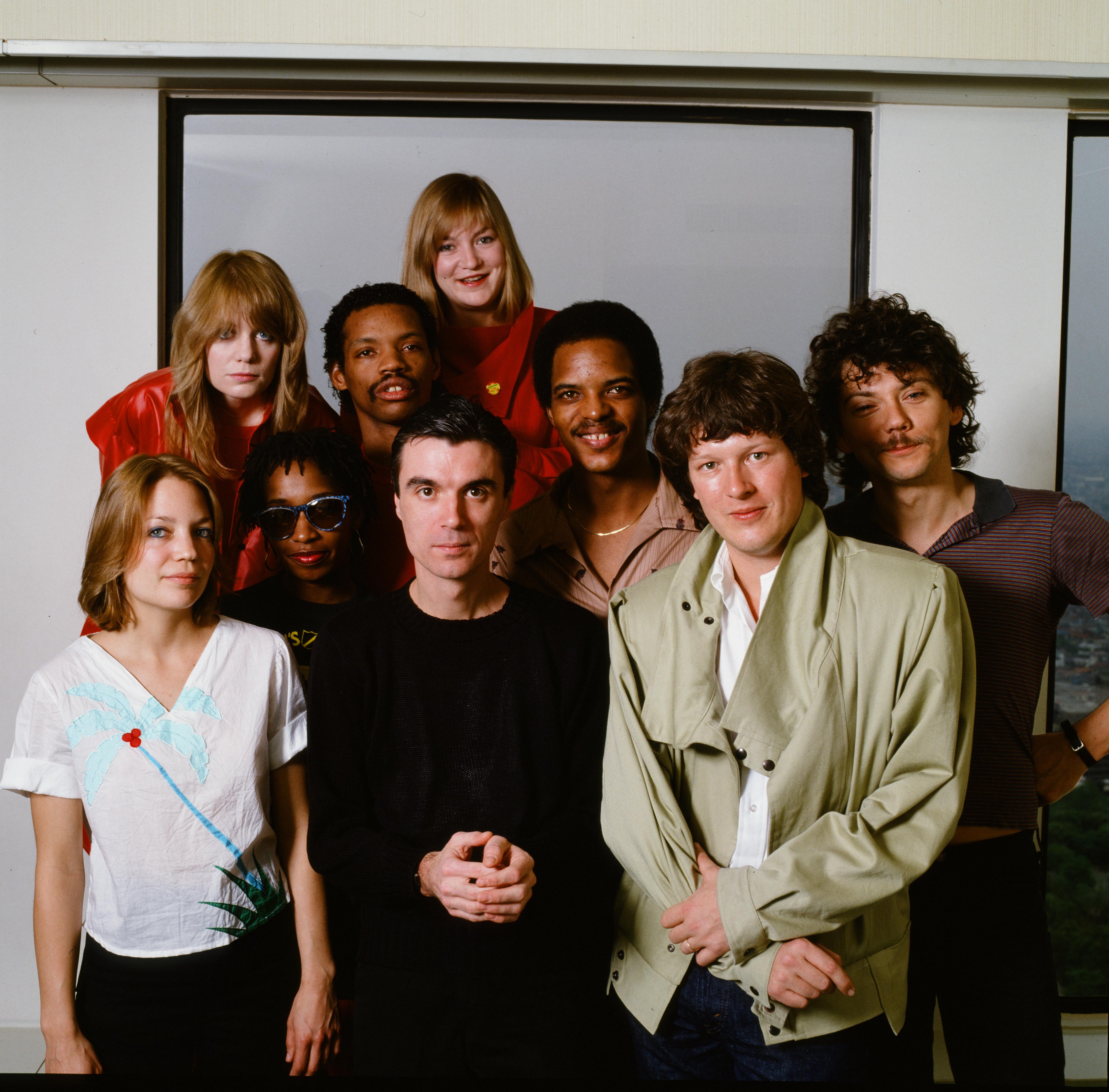 Koh Hasebe/Shinko Music/Getty Images[/caption]
Koh Hasebe/Shinko Music/Getty Images[/caption]
I wrote "Creature of Love," a country-and-western song, in New York. I mentioned to the band that I wanted to write a song about when people sleep together, they produce these little creatures six or seven inches tall. I thought that would be funny. But I didn't know how to write the song. All I had was one section; two couplets that I liked: "Little creatures of love / With two arms and two legs / From a moment of passion / Now they cover the bed."
Sure enough, it turned into a country-and-western song. On the surface at least, it sounds like a straightforward, heart-rending tune, but the subject is a little bit odd. The beauty of it was writing a ballad, instead of some spooky little monster stomp. That was the challenge.
The important stuff in people's lives comes through in their living, in what they think about and what they believe in. That's what I try to write about, rather than writing about stuff that's bigger than life.



